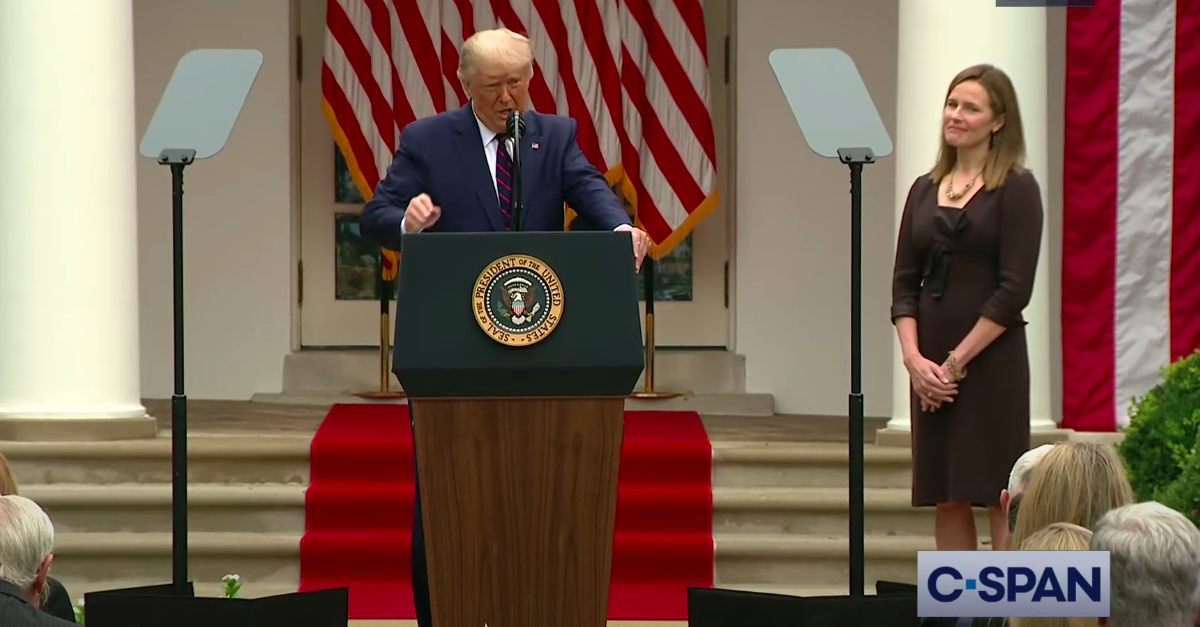
Donald Trump announces the nomination of Amy Coney-Barrett for the U.S. Supreme Court from the White House Rose Garden on Sept. 26, 2020 (C-SPAN).
The judge presiding over Donald Trump’s criminal hush-money case in New York on Monday refused to dismiss the dozens of felony convictions against the president-elect in light of the Supreme Court’s sweeping immunity decision, using, in part, the reasoning put forth by the last justice Trump himself placed on the high court.
The ruling stems from Trump’s May 2024 conviction on 34 counts of falsifying business records in the Empire State. The charges resulted from a $130,000 hush-money payment made by Trump’s former personal attorney and fixer, Michael Cohen, to adult content creator Stormy Daniels in October 2016.
Acting New York Supreme Court Justice Juan Merchan cited Justice Amy Coney-Barrett’s concurring opinion in Trump v. United States to emphatically rule that the underlying conduct resulting in Trump’s convictions did not constitute the “official conduct” of a president that is entitled to absolute immunity from prosecution.
Following the high court’s July ruling, Trump’s attorneys argued that portions of the evidence presented during the former and soon-to-be president’s criminal trial earlier this year were improperly shown to the jury.
The Supreme Court justices ruled that a sitting president is immune from prosecution for any official acts taken while in office and evidence of a president’s official acts cannot be used against a president in a criminal case, even where the underlying conduct is personal in nature.
Trump argued that a subset of evidence admitted at trial constituted official acts deserving of some level of immunity. Specifically, Trump claimed that the state improperly admitted evidence of Trump’s communications with former Trump White House employees Hope Hicks and Madeleine Westerhout, as well as his former personal attorney Michael Cohen.
In analyzing whether such evidence was entitled to absolute immunity, Merchan noted that Justice Coney-Barrett provided the court with ” a highly useful legal tool.”
“As noted by Justice Coney-Barrett in her concurrence in part, in the absence of precedent directly on point, the use of a hypothetical is a highly useful legal tool and one would be hard-pressed to devise a hypothetical more on point to guide the analysis between official and unofficial conduct than the case at bar: is a President’s in-office conduct to conceal payments to an adult film actress to keep information from the public eye relating to an encounter that occurred prior to his Presidency official or unofficial?” Merchan wrote in the 41-page decision.
Merchan then noted that another judge who analyzed the case similarly concluded that Trump’s actions regarding the hush-money payments to Daniels were entirely private in nature. U.S. District Judge Alvin K. Hellerstein reviewed the case last year when Trump sought to move it from New York state court to federal court.
Hellerstein rejected the removal request, reasoning that Trump reimbursing Cohen for the hush money payments to Daniels “cannot be considered the performance of a constitutional duty” and “falsifying business records to hide such reimbursements, and to transform the reimbursements into a business expense for [defendant] and income to Cohen, likewise does not relate to a presidential duty.”
“It is therefore logical and reasonable to conclude that if the act of falsifying records to cover up the payments so that the public would not be made aware is decidedly an unofficial act, so too should the communications to further that same cover-up be unofficial,” Merchan wrote.







